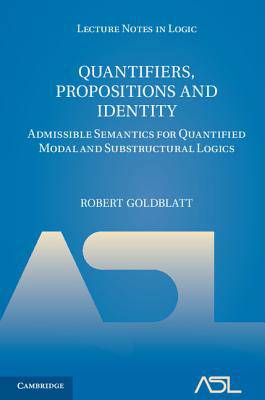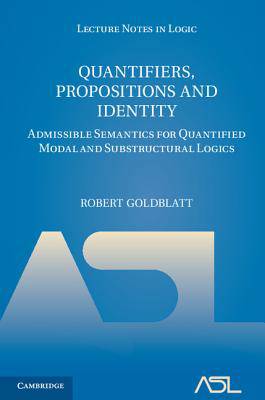
- Afhalen na 1 uur in een winkel met voorraad
- Gratis thuislevering in België vanaf € 30
- Ruim aanbod met 7 miljoen producten
- Afhalen na 1 uur in een winkel met voorraad
- Gratis thuislevering in België vanaf € 30
- Ruim aanbod met 7 miljoen producten
Zoeken
Quantifiers, Propositions and Identity
Admissible Semantics for Quantified Modal and Substructural Logics
Robert Goldblatt
€ 217,95
+ 435 punten
Omschrijving
Many systems of quantified modal logic cannot be characterised by Kripke's well-known possible worlds semantic analysis. This book shows how they can be characterised by a more general 'admissible semantics', using models in which there is a restriction on which sets of worlds count as propositions. This requires a new interpretation of quantifiers that takes into account the admissibility of propositions. The author sheds new light on the celebrated Barcan Formula, whose role becomes that of legitimising the Kripkean interpretation of quantification. The theory is worked out for systems with quantifiers ranging over actual objects, and over all possibilia, and for logics with existence and identity predicates and definite descriptions. The final chapter develops a new admissible 'cover semantics' for propositional and quantified relevant logic, adapting ideas from the Kripke-Joyal semantics for intuitionistic logic in topos theory. This book is for mathematical or philosophical logicians, computer scientists and linguists.
Specificaties
Betrokkenen
- Auteur(s):
- Uitgeverij:
Inhoud
- Aantal bladzijden:
- 282
- Taal:
- Engels
- Reeks:
- Reeksnummer:
- nr. 38
Eigenschappen
- Productcode (EAN):
- 9781107010529
- Verschijningsdatum:
- 14/07/2011
- Uitvoering:
- Hardcover
- Formaat:
- Genaaid
- Afmetingen:
- 152 mm x 229 mm
- Gewicht:
- 521 g

Alleen bij Standaard Boekhandel
+ 435 punten op je klantenkaart van Standaard Boekhandel
Beoordelingen
We publiceren alleen reviews die voldoen aan de voorwaarden voor reviews. Bekijk onze voorwaarden voor reviews.








